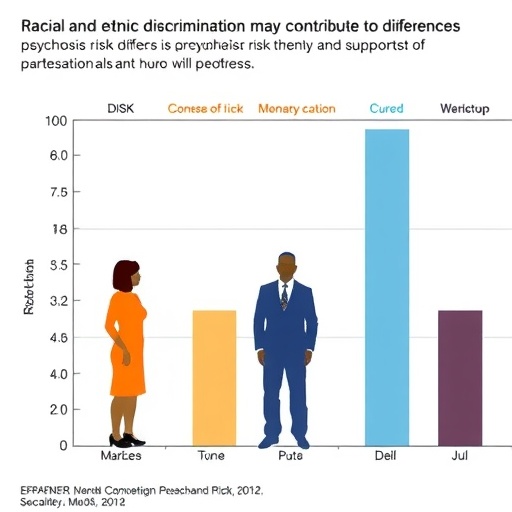Racial and ethnic discrimination has long been recognized as a profound social ill with far-reaching consequences beyond the immediate impact on individuals’ lives. A groundbreaking study published in the journal PLOS Mental Health on September 24, 2025, now adds to this growing body of research by conclusively linking experiences of racial and ethnic discrimination to an increased risk of psychosis. This severe mental health condition, characterized by symptoms such as hallucinations, delusions, disorganized thinking, and a detachment from reality, has historically shown stark ethnic disparities, and this study sheds crucial light on one of the underlying social factors contributing to that disparity.
Psychosis represents a complex constellation of psychiatric symptoms that disrupt an individual’s perception and cognition, often leading to devastating effects on social functioning and quality of life. Until now, while socioeconomic disadvantage and neighborhood adversity have been demonstrated as relevant contributors to psychosis risk, the independent role of racism—especially the subtle yet pervasive experience of racial discrimination—has lacked cohesive empirical focus. India Francis-Crossley and colleagues at University College London aimed to bridge this gap through a comprehensive synthesis of existing evidence, employing an umbrella review methodology to evaluate published systematic reviews and meta-analyses.
The research team identified seven systematic reviews spanning 23 primary studies with over 40,000 participants. Of these, five reviews explicitly examined the intersection between racial or ethnic discrimination and psychosis or psychotic-like experiences. Their analyses revealed a consistent positive association between experiences of discrimination and heightened psychotic symptoms and risk, regardless of whether individuals had a clinical psychotic disorder or were part of non-clinical populations experiencing subthreshold psychotic symptoms. Notably, the largest effect sizes were observed among those without a psychotic diagnosis, underscoring the insidious role discrimination may play in the prodromal or early stages of psychosis manifestation.
One critical dimension of this work is its focus on experiential discrimination as a driver of mental health disparities. While prior studies have looked at broad social determinants such as poverty, neighborhood crime, or trauma, this review underlines how interpersonal racism functions as a unique and powerful stressor destabilizing mental health. The physiological and psychological toll of persistent discrimination—manifesting in chronic stress, social marginalization, and diminished access to support—is now firmly implicated as a pathway to psychotic symptom development. This nuance calls attention to the need for refined clinical and public health approaches that specifically address racism’s direct effects.
The authors are careful to highlight several limitations in the literature they synthesized. Methodological heterogeneity among studies, including variable measurement of discrimination and psychosis outcomes, challenges the comparability of results. Sample sizes in some primary studies were limited, potentially affecting statistical power. Furthermore, the scholarly disproportion favoring research conducted in Western contexts like the United States and Europe leaves a global gap. Importantly, most studies focused on interpersonal forms of racism rather than structural or institutional types, which likely exert wider systemic influence over health disparities and thus remain underexplored.
The implications of these findings are vast and urgent. Psychosis has profound personal, societal, and economic costs, and understanding its social determinants is vital for prevention. Francis-Crossley underscores the importance of this evidence base as pivotal for formulating targeted policies and clinical interventions that can mitigate psychosis risk among marginalized ethnic populations. By explicitly linking racism to mental health pathology, this body of research demands that policy makers integrate measures combating discrimination alongside traditional mental health initiatives.
Senior author James Kirkbride from University College London emphasizes the public health urgency, noting that despite compelling evidence linking racism with psychosis, inadequate efforts exist to confront racism’s ingrained societal presence. The consequences of inaction include worsening erosion of civic trust and the perpetuation of intergenerational mental health disparities. Such commentary reframes racism not just as a moral failing but as a critical determinant with tangible health outcomes, challenging societies to adopt a multi-sectoral approach for redress.
Complementing this, Juliana Onwumere from King’s College London asserts that racism should be recognized as a global mental health threat, akin to a societal pathogen. Her insights remind us that racism is neither an immutable reality nor a medical condition but a socially constructed phenomenon whose ongoing presence exacts significant human costs. This reframing invites both rigorous scientific inquiry and societal commitment to dismantling systemic racism as a matter of mental health equity and social justice.
The study’s funding sources, including prestigious fellowships and grants from Wellcome Trust, the National Institute for Health Research, and UK Research and Innovation, reflect the growing prioritization of intersectional mental health research. Importantly, funders maintained no influence over research design, analysis, or publication decisions, underscoring the independent rigor of the work. The authors’ open declaration of no competing interests further enhances the credibility and impact of their conclusions.
In conclusion, the synthesis by Francis-Crossley and colleagues provides compelling evidence that racial and ethnic discrimination is not merely a social injustice but a significant risk factor for psychosis. This revelation amplifies calls for integrative public health strategies that address racism’s multiple dimensions—interpersonal, institutional, and structural. As psychosis remains a deeply burdensome disorder, these findings mark a critical advance toward confronting the root causes of mental health inequities and fostering resilient, inclusive communities. The study’s publication in an open-access journal ensures wide dissemination and accessibility, catalyzing further research and policy innovation on this urgent global challenge.
Subject of Research: People
Article Title: The association between racism and psychosis: An umbrella review
News Publication Date: 24-Sep-2025
Web References: https://doi.org/10.1371/journal.pmen.0000401
References: Francis-Crossley I, Hudson G, Harris L, Onwumere J, Kirkbride JB (2025) The association between racism and psychosis: An umbrella review. PLOS Ment Health 2(9): e0000401.
Image Credits: Markus Spiske, 2018, Free to use under the Unsplash license




